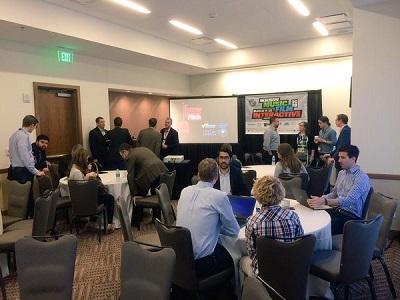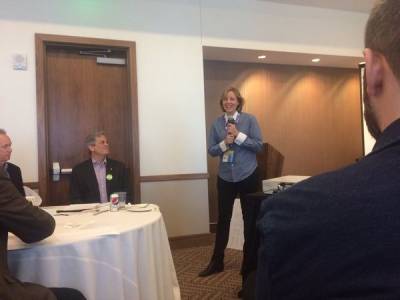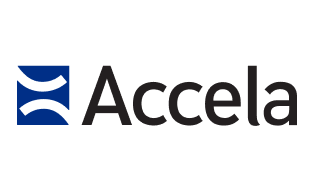
South by Southwest (SXSW) is an annual set of conferences and festivals staged in Austin, TX, that showcase original music, independent films and emerging technologies. The SXSW Interactive conference specifically is a breeding ground for new ideas and creative technologies, including a startup accelerator.
2016 marked the first year SXSW offered a government track, because rather than SXSW happening to the City of Austin, the organizers wanted it to happen in collaboration with the City of Austin. The organizers had the opinion that “Mayors need to embrace civic tech startups early, be part of the iterating, and help frame the issues to make it easier for companies to navigate the bureaucratic dark matter within their organizations.”
The Mayor of the City of Austin and the City of Austin Innovation Office put out the following questions to civic tech startups across the country:
How might startups and entrepreneurs help cities solve their toughest challenges? Do you have an amazing product, company or program at South by Southwest Interactive that can solve U.S. cities’ tough challenges? Are you looking to find a dynamic way to help build, prototype or validate that solution in one of America’s largest cities? Want an opportunity to partner with mayors around the country to use their cities as test sites to support your efforts?

Mayor Steve Adler from the City of Austin
Eddie Tejeda, the co-founder of Civic Insight and former Code for America fellow, was invited to speak at SXSW during the Code for America Tech Innovation Pitch to a panel of Mayors and industry experts. Civic Insight entered into a strategic partnership with Accela in November 2015. Civic Insight measures and tracks permitting, code enforcement and planning data in an easy-to-use interface that features interactive maps and visualizations that allow citizens and agency staff keep up to date on homes and neighborhoods. I wanted to hear more about the experience, so I took the opportunity to interview Eddie upon his return from the event.
What an exciting opportunity it is to be a part of the SXSW experience, especially as a presenter. Can you elaborate on how you heard about the SXSW pitch?
They [the City of Austin Innovation Office staff and the Austin Mayor’s Office] decided to host a pitch to bring startups in to hear about new, innovative products emerging in the civic tech space and offer a government theme into SXSW:
MAYOR’S CALL TO ACTION: We need creative solutions to our most pressing challenges now more than ever. Mayors need your help to find the next generation of solutions to their biggest issues like transportation, civic engagement, housing, job creation, education, health, and many more. Pitch your product, company, or program to a panel of mayors and get the opportunity to win funding to travel to cities across the country and partner with them to implement your solutions.
Because of our recent work in the space and our background with Code for America, we were invited to talk about Civic Insight.
Civic Insight seems to be in perfect alignment with the Mayor’s Call to Action. How did the pitch go, and who else was involved?
Civic Insight makes citizen interaction and participation easier, and we like to think we embodied the presidential call to action as well.
President Obama, in his SXSW keynote and his preceding weekly address, listed three ways that tech talent can make a difference:
- Make government work better through digital services to improve citizen interactions with government
- Use new technologies to allow us to tackle big problems in new ways
- Use big data, analytics, technology to make civic participation easier
In terms of the pitch, it was an intimate space with mayors and City staff and other industry leaders. It was an honor to be a part of the other companies and to speak to mayors, including Steven Adler of Austin, Jorge Elorza of Providence, Stephanie Rawlings-Blake of Baltimore, Christopher Cabaldon of West Sacramento, Greg Fischer of Louisville, Sly James of Kansas City, plus Code for America COO Maryann Kongovi and U.S. State and Local Government GM of Amazon Web Services Frank DiGiammarino, about exciting products in the civic tech space.
In my pitch, my focus was on the potential for how cities can more easily use open data, if it is presented in a simple and beautiful interface. This is information that senior officials can use to see what is happening in the city with visualizations and maps, to see how the city is developing and if there are any red flags that city officials should be aware of.
I spoke about how Civic Insight evolved from providing mapping, permitting and code enforcement for individual cities, to working on the Accela Civic Platform where we can map, analyze and visualize data not only for individual cities, but also for all activity related to building in cities and across jurisdictions.
The day was capped off by a visit from Megan Smith, CTO to the White House, who spoke about the importance of civic startups and how thinking creatively about technology can help improve people’s lives. Everyone in attendance was excited to have her pop in at the last minute – she had the audience enthralled. It is great the White House is paying attention to the work cities are doing, and shows that the work we are doing in terms of building the structure that powers our government is in fact very important.

CTO to the White House Megan Smith made a surprise visit
It sounds like an interesting group of people. What are they most interested in solving for their community?
These people are the leaders in the space; their cities have often deployed modern civic apps, they have an engaged community and they understand the value of engaging the public and why it is important. They are setting the tone for the way future cities are going to think about engagement in the 21st century.
It is interesting that the City of Austin is already a customer of yours. Can you talk about your relationship with the City?
We have been working with the City of Austin for over a year now; they are an engaged customer who is really excited about what we are doing. In fact, you can check out their website, Austin Code Case Tracker. We worked with their Code Enforcement department to publish that data and keep it up to date on a data portal, which they then made interactive. Since they launched the portal, they have had a very engaged community, and City staff have also been very involved. Civic Insight and Accela believe in data standards like BLDS and Austin conforms to a version of the standard called HouseFacts Lite.
Can you elaborate on what the BLDS format is, and why it is important?
The BLDS format is a standard for permitting data that has a lot of industry support from companies like Accela, BuildingFacts and Socrata, which have come to understand that companies publishing data should publish data that is compatible so there is continuity across cities. The BLDS standard has a lot of support across players, and Accela has had a leadership role in helping to build and grow this standard.
The BLDS standard is an important contribution to the open data movement because it encourages cities to not just publish their raw data, but to publish their permitting data in a way that is consistent to ensure that the public can understand what the fields mean and how to use and interpret it.
After attending SXSW for this pitch, what would you say was the best part of the event?
Personally, it was great to be with familiar faces like Code for America and other civic startups, and to convene and spend time together—it served as a reminder of the great people working in this space.
As a first-time attendee, it was incredible to be a part of this event that takes over the city. You feel the energy of the event everywhere you go. It has become a huge cultural event, with the city being transformed through the conference’s various events and gatherings.
Civic Insight joined Accela last fall; how has the experience been? How has life changed for you?
The last few months have been very exciting. Being part of Accela has allowed us to think about the product at a different scale– rather than thinking about how we can work with individual cities, we are instead thinking about how we can bring Civic Insight to every city in America. This has been exciting for us in terms of the impact we can have. The support and backing of a great team opens up new opportunities for us in how we can continue to develop the product.
What is the next exciting thing for your product? What are you thinking about next?
Civic Insight just launched in Tampa, which is exciting. In terms of the product, we are making major improvements to the dashboard capabilities. We think this is growing in importance because there is a lot of value that is locked into the data that shapes the decisions of many people. Accela holds some of the most important datasets used to measure the health of the economy. Planning, permitting and code enforcement data is critical data that gives us insight at a local and national level regarding the health of the economy. We are excited to compile all this data in real-time dashboards to see what is happening anywhere in the country.
Thanks for the insight into your SXSW experience, and welcome again to Accela!




